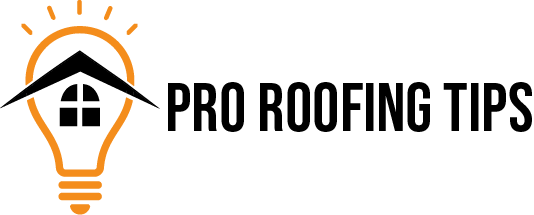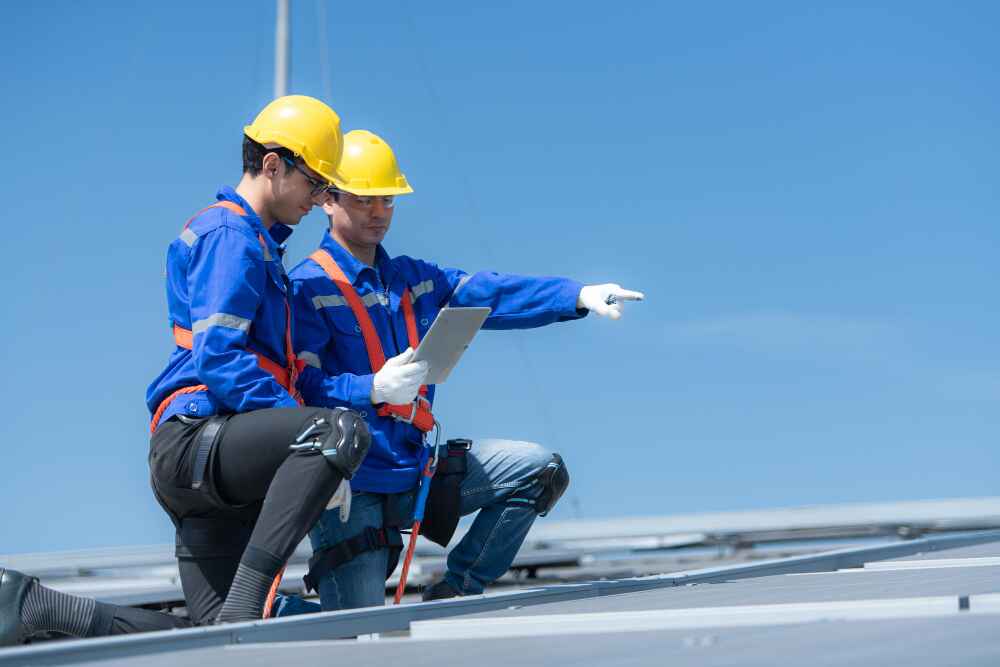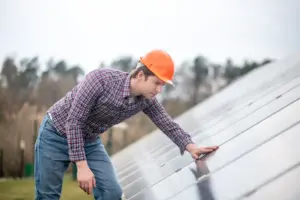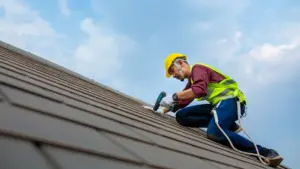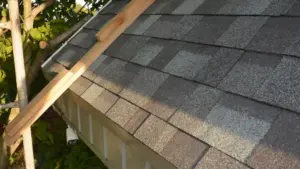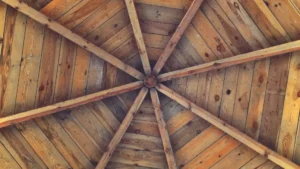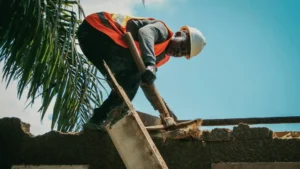If you’re like most homeowners, you want straight answers about pricing without the runaround. You’ve come to the right place. This comprehensive guide breaks down everything you need to know about roof inspection costs, from basic residential checks to advanced commercial assessments. By the end of this article, you’ll have the knowledge to make informed decisions about protecting one of your most valuable investments.
Understanding Roof Inspection Costs: The Basics
When it comes to roof inspection cost, there’s no one-size-fits-all answer. Several factors influence pricing, and understanding these variables helps you budget appropriately and avoid surprise charges.
The national average for a standard residential roof inspection ranges from $200 to $600, with most homeowners paying around $400 according to Angi’s 2025 data. However, this baseline can shift significantly based on your specific circumstances. Commercial properties typically see higher costs due to their complexity and size requirements.
Location plays a crucial role in determining costs. Urban areas with higher living expenses generally command premium pricing, while rural locations might offer more competitive rates. The accessibility of your roof, its age, and the complexity of its design all factor into the final price quote.
Most professional inspectors spend 2-3 hours conducting a thorough examination, checking everything from shingles and flashing to gutters and structural integrity. This time investment, combined with the inspector’s expertise and liability insurance, justifies the professional service cost.
How Much Does a Roof Inspection Cost? Breaking Down the Numbers
Understanding how much does a roof inspection cost requires examining different property types and inspection methods. Let’s dive into specific pricing scenarios to give you realistic expectations.
Residential Roof Inspection Pricing
For single-family homes, basic roof inspections typically cost between $200-$500. This covers a comprehensive visual examination of your roof’s exterior and interior components. Inspectors check for missing or damaged shingles, examine flashing around chimneys and vents, assess gutter systems, and look for signs of water damage in your attic space.
Ranch-style homes with simple roof lines usually fall on the lower end of this range, while multi-story houses with complex architectural features command higher fees. The square footage of your roof directly impacts pricing, as larger surfaces require more time and attention to inspect thoroughly.
Premium inspections that include detailed reports with photographs and repair recommendations may cost $600-$800. These comprehensive assessments provide valuable documentation for insurance claims or pre-purchase negotiations.
Factors That Influence Residential Pricing
Several key factors determine your final inspection cost. Roof height significantly impacts pricing due to safety considerations and specialized equipment requirements. Single-story homes are generally less expensive to inspect than multi-story properties.
The roof’s condition also affects pricing. Severely damaged or neglected roofs require extra time and caution during inspection, potentially increasing costs. Seasonal timing matters too – peak seasons like spring and fall often see higher demand and corresponding price increases.
Geographic location creates substantial pricing variations. Metropolitan areas like New York or San Francisco typically charge 30-50% more than smaller cities or rural areas. This reflects higher operating costs, insurance requirements, and market demand in these regions.
Commercial Roof Inspection Cost Considerations
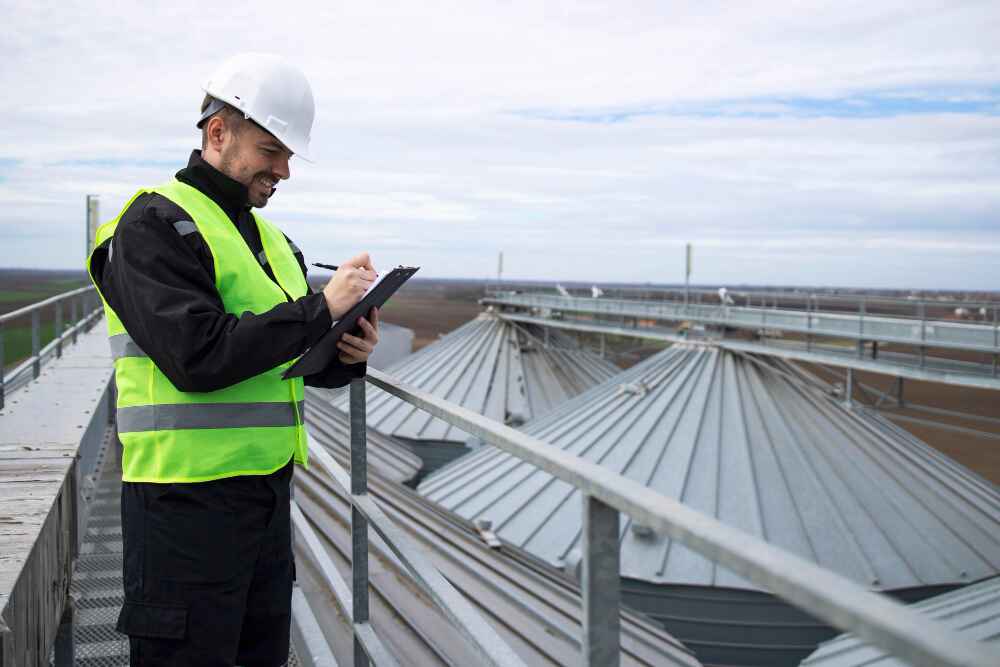
Commercial properties face unique inspection challenges that significantly impact pricing. How much does a commercial roof inspection cost depends on building size, roof type, accessibility, and complexity of systems involved.
Commercial Pricing Structure
Commercial roof inspections typically range from $500 to $2,500, with large industrial buildings potentially costing even more. The substantial price difference from residential inspections reflects the increased complexity, time requirements, and specialized knowledge needed for commercial systems.
Flat commercial roofs require different inspection techniques than sloped residential roofs. Inspectors must check membrane integrity, drainage systems, HVAC unit installations, and structural load considerations. These additional checkpoints extend inspection time and require specialized expertise.
Multi-building commercial complexes often receive volume discounts, with per-building costs decreasing as the number of structures increases. Property management companies frequently negotiate annual inspection contracts that provide cost savings compared to individual service calls.
Commercial Inspection Scope
Commercial inspections encompass far more than residential assessments. Inspectors evaluate rooftop equipment installations, check compliance with building codes, assess warranty status, and provide detailed maintenance recommendations.
The documentation requirements for commercial properties are also more extensive. Insurance companies and property managers expect comprehensive reports with photographic evidence, repair prioritization, and cost estimates. This additional documentation work is reflected in the higher pricing structure.
How Much Does It Cost for a Roof Inspection? Service Type Breakdown
The answer to “how much does it cost for a roof inspection” varies significantly based on the service type you choose. Let’s explore different inspection methods and their associated costs.
Standard Visual Inspections
Basic visual inspections represent the most affordable option, typically costing $200-$400 for residential properties. These inspections involve a trained professional examining your roof from ground level and accessible areas using binoculars and basic tools.
While less comprehensive than climbing inspections, visual assessments can identify obvious problems like missing shingles, damaged gutters, or structural sagging. They’re ideal for routine maintenance checks or when budget constraints limit options.
The limitation of visual inspections is their inability to detect hidden problems. Issues like minor leaks, early-stage deterioration, or problems in hard-to-see areas might go unnoticed until they become more serious and expensive to repair.
Comprehensive Physical Inspections
Full physical inspections cost $400-$700 but provide thorough assessments worth the investment. Inspectors safely access your roof surface to examine materials up close, test for loose components, and identify problems invisible from ground level.
These inspections include attic examinations to check for water damage, insulation issues, and ventilation problems. The combination of exterior and interior assessment provides a complete picture of your roof’s condition and helps prioritize maintenance needs.
Physical inspections are essential before major weather seasons, after severe storms, or when considering roof replacement. The detailed information they provide helps homeowners make informed decisions about repairs and budgeting.
Specialized Inspection Services
Some situations require specialized inspection services that command premium pricing. Infrared thermal imaging inspections cost $500-$1,000 but can detect moisture problems, insulation gaps, and heat loss patterns invisible to standard inspections.
Post-storm damage assessments often carry rush charges but provide crucial documentation for insurance claims. These inspections focus specifically on storm-related damage and typically cost 25-50% more than routine inspections due to their urgency and specialized nature.
Pre-purchase inspections for real estate transactions may include additional services like structural engineering consultations, adding $200-$500 to standard inspection costs. However, these comprehensive assessments can save thousands in unexpected repair costs after purchase.
Drone Roof Inspection Cost: Modern Technology Pricing
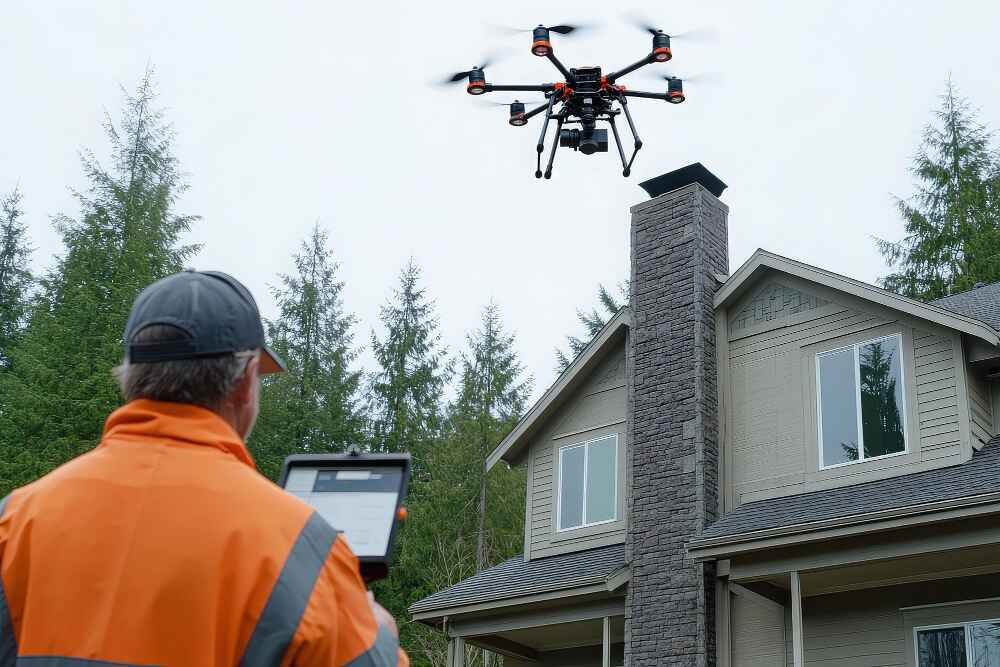
How much does a drone roof inspection cost is an increasingly common question as this technology becomes more mainstream. Drone inspections represent a modern approach that offers unique advantages and pricing considerations.
Drone Inspection Advantages
Drone roof inspections typically cost $300-$800, positioning them competitively within the standard inspection price range. However, they offer several advantages that justify their cost, particularly for challenging roof configurations.
Safety represents the primary advantage of drone inspections. Steep, high, or damaged roofs that pose risks to human inspectors can be safely assessed using drones. This eliminates safety-related surcharges and makes inspections possible in situations where traditional methods might be prohibitively expensive or dangerous.
The photographic documentation from drone inspections is exceptional. High-resolution cameras capture detailed images and videos that provide clear evidence of roof conditions. This documentation proves invaluable for insurance claims, contractor communications, and tracking deterioration over time.
Drone Technology Limitations
Despite their advantages, drone inspections have limitations that affect their applicability. Weather conditions significantly impact drone operations, with wind, rain, or extreme temperatures potentially delaying or preventing inspections.
Close-up detail examination remains challenging for drones. While they excel at overall roof assessment and identifying obvious problems, they can’t replicate the tactile examination that human inspectors provide. Issues like loose shingles or subtle material deterioration might require follow-up physical inspection.
Regulatory restrictions in some areas limit drone operations, particularly near airports or in densely populated urban areas. These restrictions can affect availability and potentially increase costs due to special permitting requirements.
When Drone Inspections Make Sense
Drone inspections are particularly cost-effective for large commercial buildings, multi-story residential properties, and roofs with limited access. They’re also excellent for routine monitoring programs where regular documentation helps track roof condition changes over time.
Insurance companies increasingly accept drone inspection reports, making them viable for claim documentation. The detailed photographic evidence often provides better documentation than traditional inspection methods, potentially speeding claim processing.
For property managers overseeing multiple buildings, drone inspections can provide efficient assessments across entire portfolios. The ability to quickly inspect numerous properties makes them cost-effective for large-scale property management operations.
Regional Cost Variations and Market Factors
Roof inspection costs vary significantly across different regions, reflecting local market conditions, climate factors, and economic considerations. Understanding these variations helps set realistic budget expectations.
High-Cost Markets
Major metropolitan areas consistently show higher inspection costs. Cities like San Francisco, New York, Boston, and Washington D.C. typically see residential inspection costs ranging from $500-$900, substantially above national averages.
These premium markets reflect higher operating costs for inspection companies, including expensive liability insurance, vehicle costs, and higher wages for qualified inspectors. The increased cost of living in these areas necessitates higher service pricing to maintain profitable operations.
However, high-cost markets often provide additional value through more comprehensive services, faster response times, and access to advanced inspection technologies. The competitive nature of these markets also drives service quality improvements that benefit consumers.
Moderate-Cost Regions
Mid-sized cities and suburban areas typically offer more balanced pricing, with residential inspections ranging from $300-$600. These markets provide good value combinations of reasonable pricing and quality service availability.
Regional economic conditions significantly influence pricing in these markets. Areas with strong construction industries often have more inspector availability, creating competitive pricing. Conversely, regions with limited inspector availability may see premium pricing despite lower overall costs of living.
Budget-Friendly Markets
Rural areas and smaller cities often provide the most affordable inspection options, with costs ranging from $200-$400 for residential properties. Lower operating costs and reduced competition can create significant savings opportunities.
However, inspector availability may be limited in these markets, potentially requiring scheduling flexibility or longer wait times. The trade-off between cost savings and convenience varies by individual circumstances and timing requirements.
What’s Included in Professional Roof Inspections
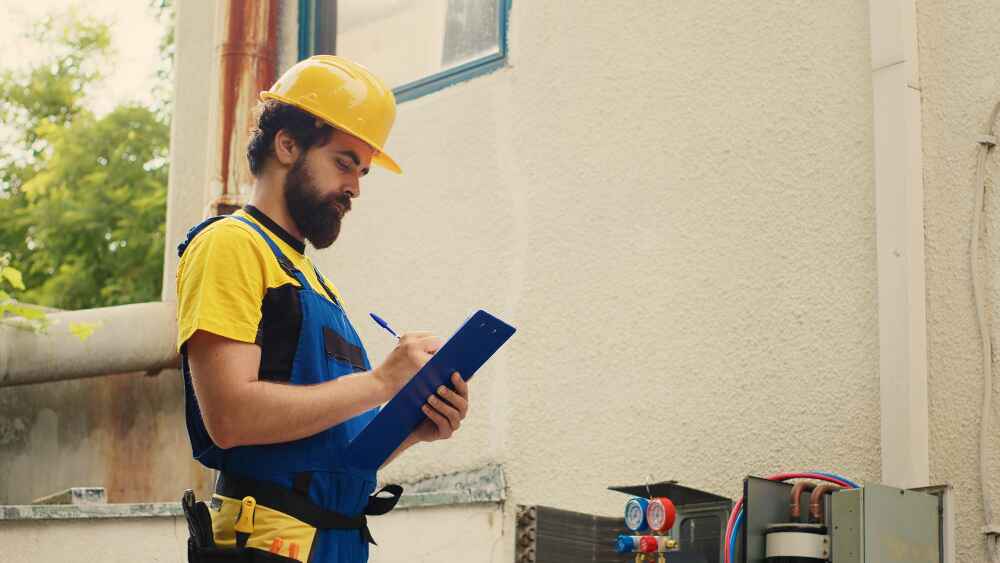
Understanding what you receive for your roof inspection cost helps evaluate service value and compare different providers. Professional inspections should include comprehensive assessments that justify their pricing.
Exterior Roof Assessment
Professional inspections begin with thorough exterior examinations covering all visible roof components. Inspectors check shingle or roofing material condition, looking for cracks, missing pieces, or signs of deterioration that could lead to leaks.
Flashing inspection around chimneys, vents, skylights, and roof transitions receives special attention, as these areas are common leak sources. Gutters and downspouts are examined for proper attachment, damage, and drainage functionality.
Structural elements like fascia boards, soffits, and roof edges are assessed for damage or deterioration. Inspectors also evaluate roof slope and drainage patterns to identify potential water accumulation areas.
Interior Components
Comprehensive inspections include attic examinations to assess interior roof conditions. Inspectors look for water damage signs, check insulation condition and coverage, and evaluate ventilation system effectiveness.
Structural components visible from the attic receive attention, including rafters, trusses, and decking materials. Signs of pest infestation, mold growth, or structural movement are documented and reported.
The inspection extends to interior spaces where roof problems might manifest, including checking for ceiling stains, wall damage, or other indicators of water infiltration.
Documentation and Reporting
Professional inspections include detailed reports documenting findings, concerns, and recommendations. These reports typically feature photographs illustrating identified problems and providing visual evidence for insurance or contractor communications.
Priority rankings help homeowners understand which issues require immediate attention versus those that can be addressed during routine maintenance. Cost estimates for recommended repairs provide budgeting guidance for property owners.
Many inspectors provide maintenance recommendations and schedules to help extend roof life and prevent future problems. This preventive guidance adds significant value beyond the initial inspection service.
DIY vs Professional Inspection: Cost-Benefit Analysis
Many property owners consider DIY roof inspections to save money, but understanding the real costs and limitations of self-inspection helps make informed decisions about professional services.
DIY Inspection Limitations
While basic roof observations are possible for property owners, comprehensive inspections require specialized knowledge and experience that most homeowners lack. Safety concerns represent the most significant limitation, as roof access involves substantial injury risks.
Professional inspectors carry liability insurance and use safety equipment that most homeowners don’t possess. The potential medical costs and liability issues from DIY inspection accidents often far exceed professional service costs.
Knowledge limitations also affect DIY inspection effectiveness. Recognizing subtle signs of deterioration, understanding structural concerns, and knowing which problems require immediate attention requires training and experience that professionals provide.
When Professional Services Provide Value
Professional inspections become essential for insurance claims, real estate transactions, or warranty requirements. Many insurance companies require professional assessment documentation for claim processing, making DIY inspections inadequate for these purposes.
The liability protection provided by licensed, insured professionals adds significant value beyond the inspection service itself. Professional inspectors carry errors and omissions insurance that protects property owners from missed problems or incorrect assessments.
For complex roof systems, multi-story buildings, or older properties, professional expertise becomes crucial for accurate assessment. The cost of missed problems often exceeds inspection fees by substantial margins.
Maximizing Your Roof Inspection Investment
Getting the most value from your roof inspection cost requires strategic planning and smart service selection. Several approaches help optimize your investment and ensure comprehensive property protection.
Timing Considerations
Scheduling inspections during off-peak seasons often provides cost savings and better service availability. Late winter or early spring timing allows identification of winter damage before major weather seasons begin.
Regular inspection schedules provide better value than emergency services. Annual or bi-annual inspections cost less than crisis response calls and help prevent minor problems from becoming major expenses.
Combining inspections with a full home maintenance checklist can unlock package discounts. Many companies offer reduced rates when roof inspections are combined with gutter cleaning, chimney services, or other property maintenance needs.
Service Selection Strategies
Comparing multiple service providers helps ensure competitive pricing and service quality. However, the lowest price doesn’t always provide the best value, particularly if inspection quality suffers or important problems are missed.
Asking about included services and report comprehensiveness helps compare providers effectively. Some companies include follow-up consultations, maintenance recommendations, or repair coordination services that add significant value.
Checking inspector credentials, insurance coverage, and customer reviews provides important quality indicators. Licensed, experienced professionals typically provide better value despite potentially higher upfront costs.
Frequently Asked Questions About Roof Inspection Costs
How often should I have my roof inspected professionally?
Most roofing experts recommend professional inspections every 2-3 years for newer roofs and annually for roofs over 10 years old. Properties in areas with severe weather may benefit from more frequent inspections, particularly after major storms.
Are roof inspections tax deductible?
For rental properties or business use, roof inspections are typically tax deductible as maintenance expenses. For primary residences, inspections are generally not deductible unless part of a home office or rental portion of the property.
Do insurance companies cover roof inspection costs?
Most insurance companies don’t cover routine inspection costs, but they may cover inspections related to storm damage claims. Some insurers offer discounts for regular maintenance, which can offset inspection costs over time.
What’s the difference between a roof inspection and a roof estimate?
Roof inspections focus on assessing current condition and identifying problems, while estimates are provided by contractors proposing specific repair or replacement work. Inspections are generally more objective and comprehensive in scope.
Can I negotiate roof inspection prices?
Some flexibility exists in inspection pricing, particularly for multiple properties, repeat customers, or off-season scheduling. However, extremely low prices may indicate reduced service quality or inexperienced providers.
How long does a typical roof inspection take?
Standard residential inspections typically require 2-3 hours, including exterior examination, attic assessment, and report preparation. Complex or damaged roofs may require additional time, while simple structures might be completed more quickly.
Should I be present during the roof inspection?
While not required, being present allows you to ask questions, understand identified problems, and receive immediate feedback about your roof’s condition. Many inspectors appreciate homeowner involvement and provide valuable maintenance guidance.
Making the Smart Investment in Your Property’s Future
Your roof represents one of your property’s most critical protective systems, and regular professional inspections are essential for maintaining its integrity and performance. While roof inspection cost might seem like an unnecessary expense, the protection and peace of mind they provide far outweigh their modest investment.
Consider this: a $400 inspection that identifies a small leak early can prevent thousands of dollars in water damage, mold remediation, and structural repairs. The documentation provided by professional inspections also proves invaluable for insurance claims, warranty issues, and property value maintenance.
The roofing industry continues evolving with new technologies like drone inspections and thermal imaging providing better assessment capabilities. These innovations offer improved value and more comprehensive property protection, making professional inspections an increasingly smart investment.
Whether you’re dealing with an aging roof, preparing for severe weather seasons, or simply want to protect your investment, professional roof inspections provide the expertise and documentation needed for informed decision-making.
Don’t wait for obvious problems to appear before scheduling your roof inspection. By then, minor issues may have developed into expensive repairs. Contact qualified roofing inspectors in your area today to discuss your property’s specific needs and get pricing for comprehensive assessment services.
Take action now to protect your property investment. Schedule a professional roof inspection this month and gain the confidence that comes from knowing your roof is ready to protect your home or business for years to come. Your future self will thank you for the foresight and planning that professional roof inspection provides.
